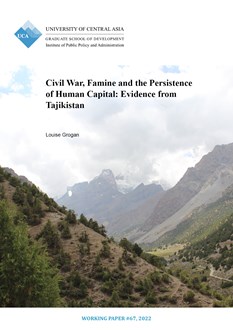Civil War, Famine and the Persistence of Human Capital: Evidence from Tajikistan
The dissolution of the Soviet Union and the 1992-96 Tajik civil war resulted in huge human and economic losses. Nevertheless, contemporary data suggests the persistence of investments in human capital in the region most affected by famine and least favoured since the cessation of hostilities in the Gorno-Badakhshan Autonomous Oblast. Famine-affected women have higher educational attainment, later ages of marriage, and lower fertility than those in the neighbouring border province of Khatlon. Educational interactions between adults and children under the age six are much more frequent. The continued emphasis on human capital after the economic collapse is consistent with a locational imperative for households to earn incomes outside of agriculture, and with a higher relative status of women in non-agrarian societies.








